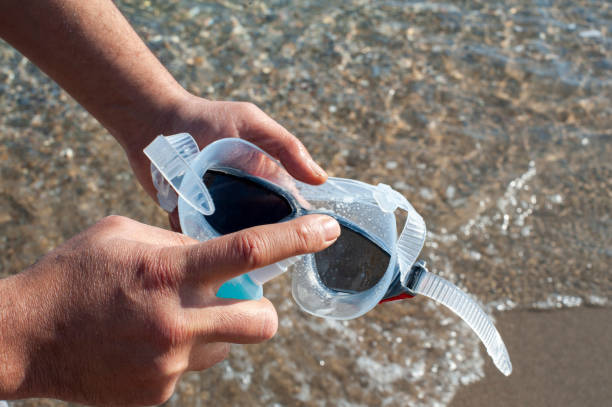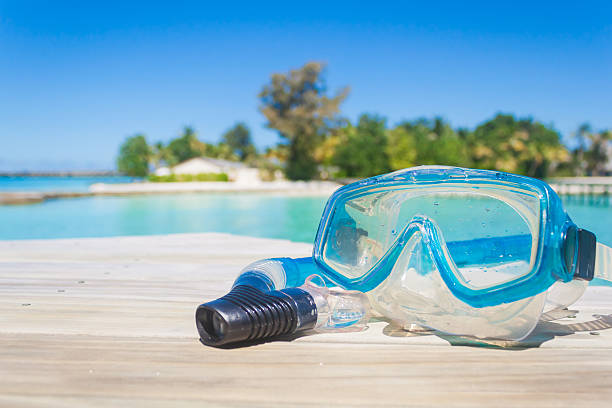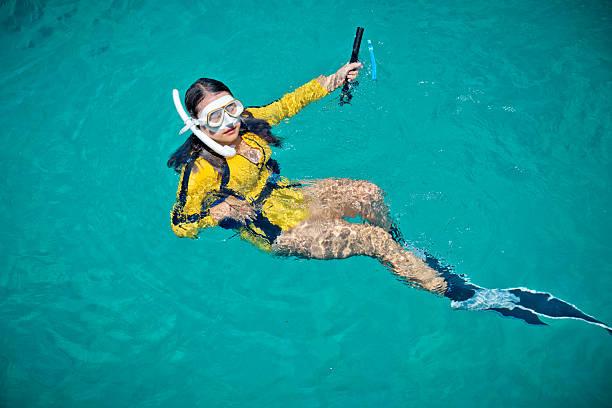Beneath the surface, a quiet world waits where every breath counts and every movement feels like flying. Free diving lets you explore this underwater playground with focus, freedom, and a sense of calm adventure.
In this beginner’s guide, we’ll dive into what free diving is, cover its different types, and uncover the surprising benefits it brings to your body and mind. We’ll also help you pick the best free diving mask so you can glide effortlessly beneath the waves.
O que é mergulho livre?
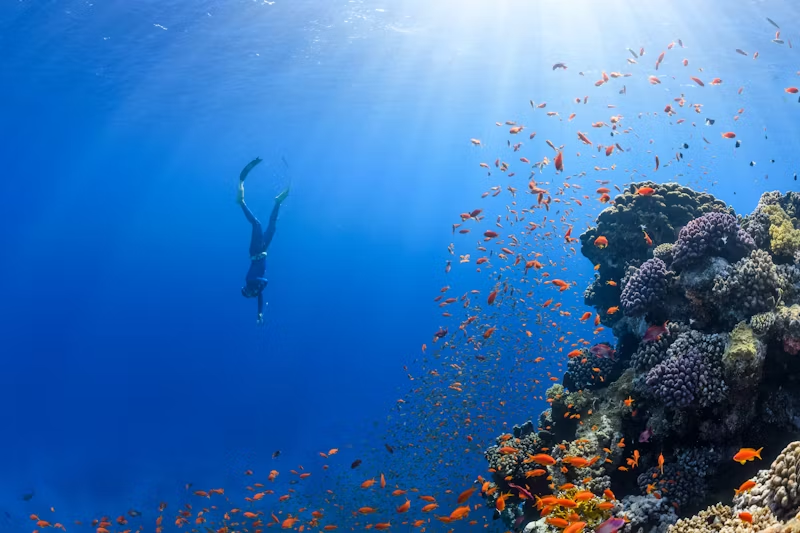
Definition of Freediving
Freediving, also called apnea diving, is the practice of going underwater on a single breath. The diver inhales at the surface and descends without any breathing equipment. Every second underwater depends on how efficiently the body uses oxygen and how calmly the diver can manage the urge to breathe.
Core Skills and Discipline
Freediving combines physical skill with mental focus. Divers train to control their breathing, relax their body, equalize pressure in ears and sinuses, and move efficiently through water. This training helps lower the heart rate, conserve oxygen, and extend the dive safely.
How It Differs From Scuba Diving
Unlike scuba diving, freediving relies almost entirely on the diver’s body and breath-hold. Scuba divers use tanks, regulators, and buoyancy gear, which allow longer underwater time. Freediving, by contrast, focuses on mastering the body’s natural abilities rather than relying on equipment.
Different Types of Free Diving
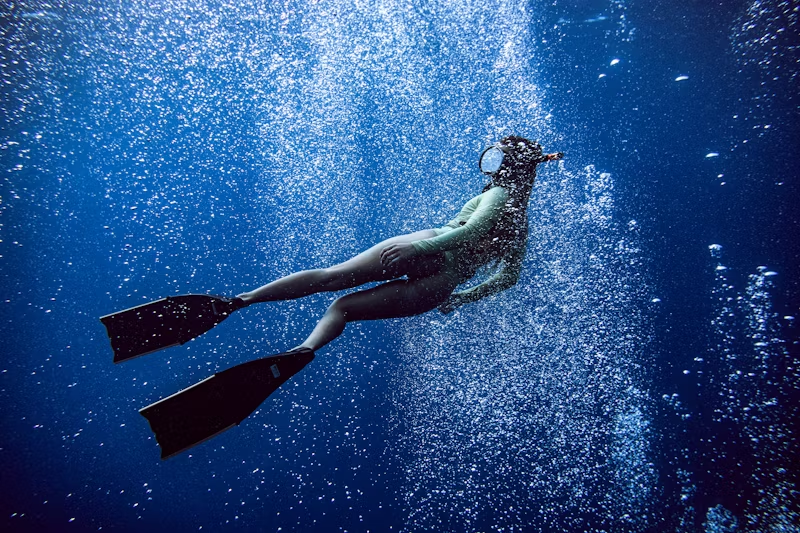
Free diving isn’t one-size-fits-all. There are several exciting ways to explore beneath the waves, each giving you a unique taste of the underwater world. Knowing the different types of free diving helps you pick the style that matches your skills and goals.
Static Apnea (STA)
Static apnea measures how long a diver can hold their breath while floating on the surface, usually face down in a pool. The diver does not move horizontally or vertically. The main focus is on relaxation, heart rate control, and efficient oxygen use. Beginners typically hold their breath for one to two minutes, while trained athletes can exceed ten minutes. This discipline builds mental focus and teaches how to manage the body under oxygen stress.
Dynamic Apnea (DYN / DNF)
Dynamic apnea is performed in a swimming pool, where the goal is to swim as far as possible on a single breath.
- With fins (DYN): Divers use long freediving fins for smoother propulsion and longer distance.
- Without fins (DNF): Divers rely only on arm strokes and leg kicks, which requires greater strength and precise technique.
Dynamic apnea helps develop stamina, body streamlining, and underwater efficiency. It also trains breath control and movement coordination, which are essential skills for all freedivers.
Constant Weight (CWT / CNF)
Constant weight disciplines take place in open water and measure depth rather than time or distance. Divers descend along a rope and return using only their own power.
- With fins (CWT): Long freediving fins provide propulsion for deeper dives.
- Without fins (CNF): Divers use only arm strokes and leg kicks, making it more physically demanding.
Constant weight is considered the classic freediving discipline. It develops both strength and technique while requiring careful energy management.
Free Immersion (FIM)
In free immersion, divers pull themselves down and up along a rope without using fins. This discipline allows precise control of descent and ascent speed and is often used for training. It helps divers focus on equalization techniques and breathing control while reducing fatigue.
No Limits (NLT)
No limits is the most extreme discipline. Divers use a weighted sled to descend and an inflatable lift bag to ascend. This allows them to reach record depths but is highly specialized and only attempted by elite freedivers under strict safety measures.
Benefits of Free Diving
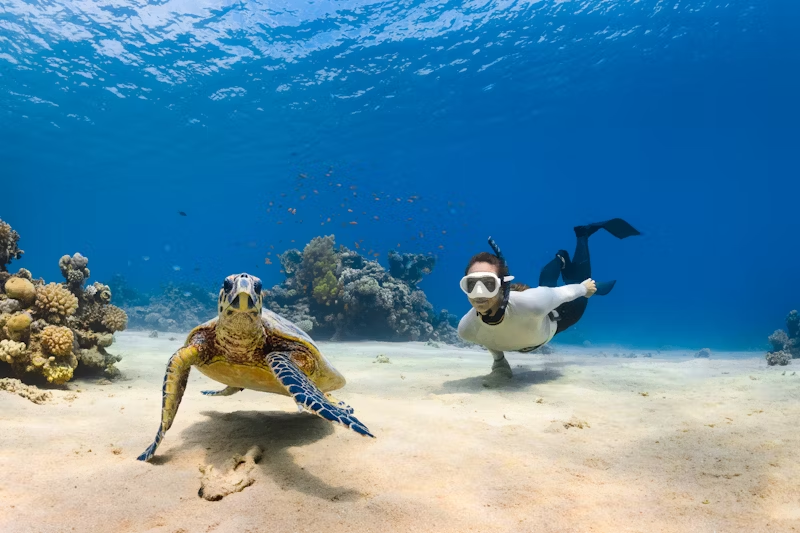
Freediving offers more than just personal challenge. It delivers measurable benefits to health, mind, and lifestyle.
Health and Fitness
Breath-hold training increases lung volume and oxygen efficiency. A study published in the European Journal of Applied Physiology found that trained freedivers often maintain resting heart rates below 55 beats per minute, similar to endurance athletes. Regular practice can improve circulation and lower stress on the cardiovascular system.
Stress Relief and Mental Clarity
Because freediving requires calmness, it works like a form of mindfulness. Divers practice slow breathing, which lowers cortisol levels and reduces stress. Many report that regular training improves concentration and emotional balance even outside the water.
Connection to the Environment
Without heavy bubbles or noise, freedivers blend more naturally with marine surroundings. This allows closer encounters with fish and corals, which makes the activity appealing to recreational ocean explorers and underwater photographers.
Practical and Cost-Friendly
Freediving does not require large tanks, compressors, or complex equipment. A mask, snorkel, fins, and a free diving wetsuit are usually enough to begin. This lower cost compared to scuba diving makes freediving accessible to more people.
Getting Started With Free Diving
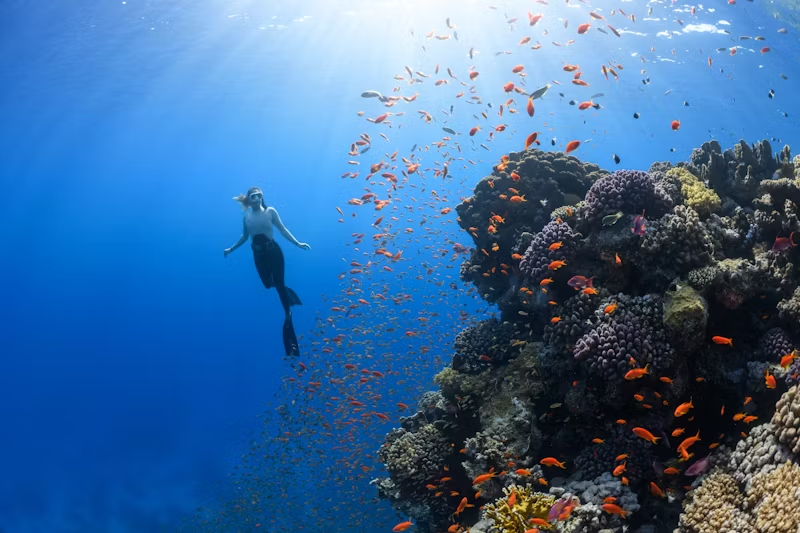
Essential Gear Checklist
The right gear makes free diving smooth and fun. Choose a snug mask for clear vision, a snorkel for easy breathing, and long snorkel fins for powerful kicks with less effort. If the water feels chilly, wear a wetsuit to stay warm, protected, and ready for longer dives. With these basics, you can dive in with confidence from the very first plunge.
Safety First
Safety is what keeps the adventure alive. Always dive with a buddy. Relax your body and mind before each dive to save oxygen and stay calm under pressure. Begin in shallow water and go deeper step by step. Progress slowly, and you will build strength, lung capacity, and confidence.
Training and Courses
In free diving, skill matters more than luck. A beginner course covers breathing, equalization, and smooth movement so you avoid common mistakes. As you improve, advanced classes introduce deeper dives, rescue skills, and performance training. Learning in steps makes every dive safer and more enjoyable.
Choosing the Best Free Diving Mask
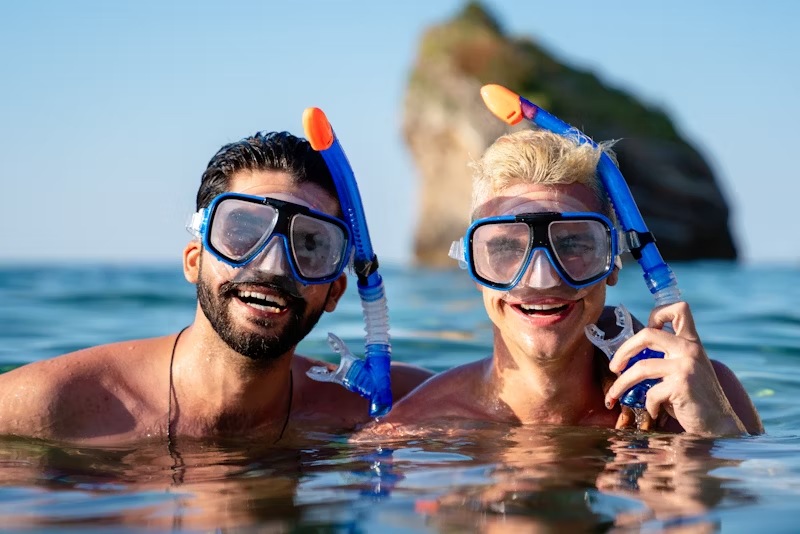
Choosing the right diving mask is key to enjoying free diving safely and comfortably. A well-chosen mask helps you see clearly, stay relaxed, and focus on the underwater adventure.
Why Your Mask Matters
A proper freediving mask is crucial for comfort, safety, and performance. During a dive, even small leaks or pressure points can distract you and reduce efficiency. The right mask helps you maintain focus, manage equalization more effectively, and move through the water with less effort. For professionals and beginners alike, investing in the correct mask ensures safer and more enjoyable dives.
Features to Look For
Before picking your free diving mask, it is helpful to know which features make a real difference underwater:
Low Internal Volume: Reduces the air needed for equalization, making it easier to dive deeper.
Silicone Skirt Quality: Soft and flexible material ensures a secure seal without causing pressure on the face. view of marine life.
Lens Design and Visibility: Wide field of view and high light transmission improve underwater awareness.
Adjustable Straps and Buckles: Easy to fine-tune for a stable, comfortable fit.
- Durabilidade: Strong, lightweight frame and high-quality materials ensure long-term performance, especially for frequent use.
Tips for Finding the Perfect Fit
Try multiple models before buying, and test them by placing the mask on your face without straps. A good mask should seal naturally, stay comfortable, and not leak when you inhale gently through the nose. Consider your training environment—pool use may allow slightly different sizing compared to open water dives. Regular adjustment and maintenance also help maintain a proper fit over time.
Considerações finais
Free diving opens up a world full of colors, creatures, and calm that few experiences can match. Every dive helps your body grow stronger, your mind stay sharp, and your spirit feel lighter.
Starting is easier than you think. With the right mask and nadadeiras de mergulho livre, like those offered by Vanguarda, you can dive safely and let your curiosity lead the way. Every dive brings new sights and fresh excitement. The ocean is ready to amaze you, and your next unforgettable adventure is just a breath away.
Ready to take the plunge?
🏊Start your free diving journey today with Vanguard at https://vanguardswimming.com.
